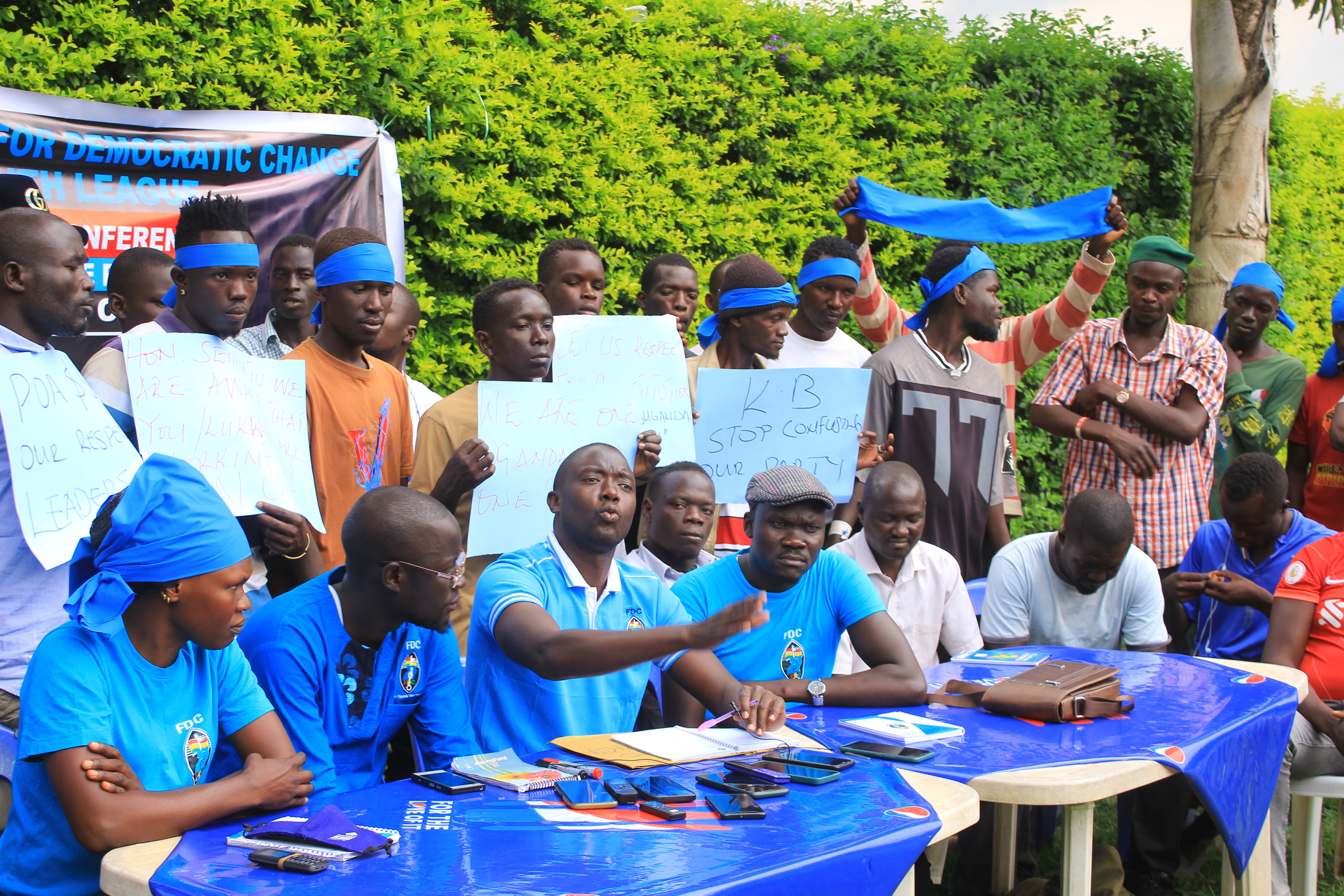FDC Youth Leaders in West Nile Disassociate Themselves from Kantoga Youth - A Tale of Party Division
In a recent turn of events within the Forum for Democratic Change (FDC) party, youth leaders from the West Nile region expressed their disappointment and disapproval regarding the actions of some party leaders during a press briefing held at Kantoga on July 25, 2023.
The leaders present at the briefing called for the resignation of the party president, Patrick Amuriat Oboi, and party Secretary, Nathan Nandala Mafabi, a move that has been deemed unconstitutional by the FDC youth leaders in West Nile.
Museum Swale, the FDC chairperson from Terego district, has clarified that the youth leaders who participated in the press briefing at Kantoga were not from the West Nile region. As such, the youth leaders from the West Nile region want to make it clear that they disassociate themselves from the actions of those mobilized by other FDC party leaders at Kantoga.
"Musema On Action," as he is popularly known, has called upon all party leaders to respect and uphold the constitution of the party. He emphasized the need for unity and urged those involved in the press briefing incident to come forward and apologize for their actions. By doing so, he believes the party can move forward in a more cohesive and constructive manner.

Center Hon. Musema Swali Speaking
Adding to the unfolding narrative, Onzima George, the FDC youth chairperson from Madi Okollo district, has raised concerns about a rumored financial scandal within the party.
He pointed out that the lack of transparency and accountability regarding party funds is putting the FDC at risk. Addressing this issue becomes crucial for the party's credibility and reputation.
Similarly, Moseka Natasha, the FDC party youth spokesperson for Arua City, stressed that there are certain party leaders who are contributing to internal divisions. However, she reaffirmed the unwavering support of the FDC youth in the West Nile region for the party, despite these challenges. Natasha believes that staying united and focused on the party's core principles is the key to overcoming such hurdles.
In light of these recent developments, it is evident that there are underlying issues that need to be addressed within the FDC party. Disagreements and conflicts among party leaders can potentially hamper the party's progress and unity. Therefore, it is crucial for all leaders to engage in open and constructive dialogue to find common ground and resolve their differences.
Furthermore, the allegations of financial mismanagement should be thoroughly investigated and resolved with transparency. A financially sound party is essential for its sustainability and credibility in serving the interests of its members and supporters.
As the FDC navigates through these challenges, the party's leadership needs to prioritize unity, adherence to the party's constitution, and the values that it stands for. Only by coming together and working collectively can the FDC overcome internal divisions and focus on its ultimate goal of promoting democracy and better governance in Uganda.
This episode serves as a reminder to all political parties that internal conflicts can weaken their influence and hinder their ability to effect positive change in society. The focus should always be on the greater good and advancing the interests of the people they represent. By upholding transparency, accountability, and unity, the FDC can reaffirm its commitment to its supporters and continue striving for a better Uganda.
Kantoga Press Briefing and Disassociation:
The press briefing held at Kantoga stirred up discontent among the FDC youth leaders from the West Nile region. It was alleged that some of the FDC youth leaders present at the briefing were not from the region and were mobilized by certain party leaders. In response, Museum Swale, the FDC chairperson from Terego district, made it clear that the actions of these leaders do not represent the sentiments of the West Nile youth leaders. They firmly disassociated themselves from the call for the party president and secretary to step down, asserting that such demands go against the party's constitution.
Key to note
The FDC has advocated for democratic principles, human rights, and good governance in Uganda. It has been involved in various political activities, including participating in elections and advocating for electoral reforms. Like many opposition parties, FDC has faced challenges in its attempts to gain political power, including allegations of government repression and limitations on political space.
The FDC was founded in 2004 and has been a significant opposition party in Uganda. It was formed as a result of a merger between several opposition parties and civil society organizations, with the main aim of challenging the long-standing rule of the National Resistance Movement (NRM) led by President Yoweri Museveni.
The party has been involved in several elections, both at the presidential and parliamentary levels. Kizza Besigye, a prominent opposition figure and former member of the NRM, was one of the key leaders of the FDC and ran for president multiple times as the party's candidate.
Here are some additional details about the event:
- The statement was issued on July 27, 2023 signed by the FDC Youth Leaders in West Nile, including Moses Odokonyero, the FDC Youth Leader for Arua District .
- The Kantoga Youth have been accused of carrying out attacks against their opponents in Arua, Nebbi, and Zombo districts.
- The FDC Youth Leaders in West Nile said that they will continue to work for a peaceful and democratic Uganda.
Author: Anwangkani Franco, Dailywestnile.info